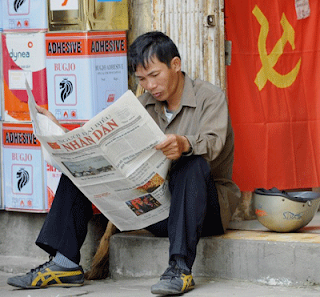Popular Vietnamese Blogger Fired by Newspaper
By THE ASSOCIATED PRESS
The Irrawaddy News
HANOI — one of Vietnam's most popular and boldest bloggers has been fired by his newspaper after the ruling Communist Party complained to editors about his writings.
Huy Duc, who writes his blog under the pen name "Osin," was dismissed this week because his postings did not reflect the editorial positions of Saigon Tiep Thi, said Tran Cong Khanh, an editor at the newspaper. Huy Duc sits reading a newspaper in downtown Hanoi. (Photo: Getty Images)
Huy Duc sits reading a newspaper in downtown Hanoi. (Photo: Getty Images)
Khanh cited a recent Osin posting that praised the fall of the Berlin Wall and criticized the former Soviet Union's Communist leaders, saying their rule had led to years of misery for the people of Eastern Europe. Duc referred to the wall as "the wall of shame."
"The attitude of his entry did not reflect that of our newspaper, and we can't use him anymore," Khanh said.
Khanh said the newspaper made the decision to dismiss Duc on its own, without direct pressure from the government, which strictly monitors Vietnam's state-controlled media.
But he acknowledged that the Propaganda and Education Commission, the Communist Party's media watchdog, had complained about roughly 100 of Duc's blog postings and newspaper stories.
Duc's Osin blog has tested the limits of free expression in Vietnam, frequently featuring articles critical of government leaders and their policies.
He has chided leaders for chartering Vietnam Airlines planes to fly abroad, and criticized a controversial bauxite mining project in Vietnam's Central Highlands which critics say could devastate the environment of the region, home to many of the country's 54 ethnic minorities.
Vietnam has about 700 news outlets, all of which are state-controlled. While some newspapers have grown more aggressive in their coverage of issues such as corruption, they rarely challenge the government. Saigon Tiep Thi is published three times a week by Ho Chi Minh City's Trade and Investment Promotion Center. Duc had worked there for several years.
The Vietnam Journalists' Association, whose members work for the state-controlled media, declined to comment on Duc's dismissal.
Duc also declined to comment Thursday.
But on his blog, he wrote that he has lost many newspaper jobs during his 21-year journalism career. He said he plans to work on a book and hopes to eventually find a job at another paper.
"The media, although under state control, belongs to society," Duc wrote. "It must be a place for truthful articles, analysis and criticism."
Last year, authorities arrested reporters from two major newspapers, Thanh Nien and Tuoi Tre, after they reported aggressively on a major corruption case.
This year, the government tightened its rules for bloggers, who have proliferated in Vietnam. The new rules say bloggers must restrict themselves to writing about personal, not political, matters.
A blogger known as Dieu Cay was charged with tax evasion and sentenced to 30 months in jail after encouraging people to protest at the Olympic torch ceremonies in Ho Chi Minh City shortly before last summer's Beijing Olympics.
He criticized China's policies in Tibet and the Spratly islands, an archipelago in the South China Sea that is claimed by China, Vietnam and several other countries.










